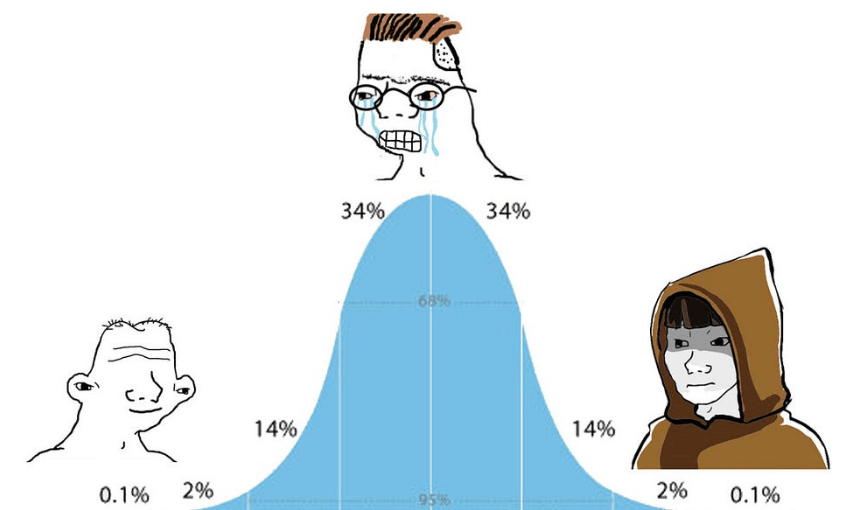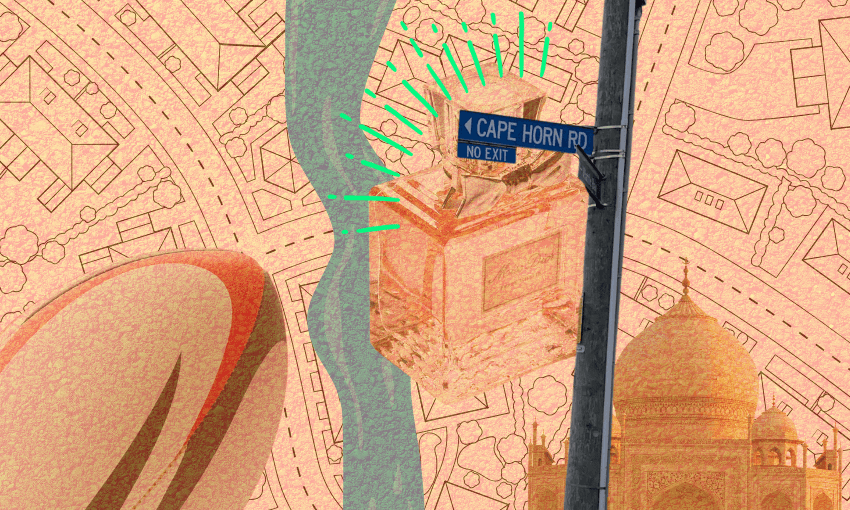The most reliably brutal burn is to call someone average. Why?
This article was first published on Madeleine Holden’s self-titled Substack.
I have a painful confession: I’m responsible for not just one but two of the most viral anti-male slogans of the 2010s. I coined “dick is abundant and low value” in 2014, an experience I wrote about here, but you know that “grant me the confidence of a mediocre white man” formulation? That, I’m sorry to say, was me as well.
You’ve probably seen it credited to journalist Sarah Hagi, who tweeted in 2015, “God give me the confidence of a mediocre white dude”. But Hagi was upcycling my secular and clumsily phrased version from a year earlier, “aspire to have the same level of self-belief as a truly mediocre white man”.
Until now, I’ve never corrected the record, because if you say something cringe and of its moment – if you bring a Frankenstein’s monster of 2010s misandry to life – and then someone else takes credit, you should accept that for the gift it is. For a decade, I did. But the truth is, in 2014, mediocre white men everywhere were minding their own business, and I raised the first pitchfork against them. I watched from the shadows as the Etsy mugs and T-shirts proliferated, the spinoff slogans spawned, and my phrase entered the common lexicon.
And who am I? A mediocre white woman.
What’s that you said? Did I hear you protest that I’m being too hard on myself? That I’m at least slightly above average in several respects? Thank you. Thank you so much. It would have been devastating to bait you like that — to call myself mediocre, middle-of-the-road, no great shakes — and hear nothing but the silence of tacit agreement.
Why, though?
Being average is, by definition, not bad. But the most brutal burn across the ages is to tell someone they’re in the middle. Today, the preferred insult is “mid”. In the 2010s, what really stung about the “mediocre white men” slogan was, of course, the “mediocre” part. Other cousins in recent years include “basic”, “normie”, “NPC”, “local”—how embarrassing, to live in the ordinary town where you live! To be similar to other people! Look at you, you adequate dork, in the middle of an OK mass.
The writer Max Read reckons there’s something structural about internet communities that causes them to turn on the normie figure—something that nurtures “the desire to separate … from some less sophisticated, less unique, less alive imagined other”—harking back to the early days of message boards. I’m sure that theory has legs, but it’s worth noting this impulse predates the online age. When I was a teenager in the 2000s, before social media, we used “average” as a slur—as in, “she’s average” to denigrate a woman’s looks or “the party was average” to describe a flop night. What’s the most savage thing you can say about a woman’s looks, since pretty much forever? Not that she’s hideous. That she’s plain.
No wonder I can recall, with forensic detail, the moments I was insulted this way. A man on Twitter once told me I had “milquetoast takes”; another told me he hoped I’d get raped by a horse. Which do you think hit a nerve? Back at law school, a guy I knew, spurred by romantic jealousy, took to telling our mutual friends I was a “garden-variety Westie sluzza”. Let me break that down for you. Sluzza is Dunedin slang for “slut”, “Westie” means bogan (I come from West Auckland, a working-class area.) So far, so zzzzzz — digs at my hardy class background by pampered snobs are an own goal, if anything, and I’ve been called some version of “slut” about a thousand times, which barely raises my blood pressure. But a garden-variety slut? That cut deep.
(If you’re reading this, Alex, then no hard feelings, you soft-handed Epsom baby.)
It’s interesting, isn’t it, that it somehow stings more to be called mediocre than butt ugly. During the pandemic, I became fascinated by the online right, burrowing deep down their rabbit holes. At the time, their favourite way to own the libs was by calling them “midwits”, ie by pointing out their average intelligence. A bell-curve meme did the rounds, showing dullards and geniuses united in their views, with the crybaby midwit and his reasoned, liberal worldview lodged for mockery between the two.
You can try this thought experiment yourself. Would you rather be called a moron or a midwit? In this age of himbo appreciation, when “no thoughts, head empty” is considered an ideal state, I can’t imagine opting for the latter. In our memetic universe, simpletons are heroes: you want someone to marvel at the “borderline medical quality of your stupidity”, to paraphrase someone on X.com recently. What would actually stain your honour, the burn you would never recover from, is someone pointing and laughing, Nelson Muntz style, at your position 0.25 standard deviations from the mean.
Why do we posture like this? Almost all of us, after all, are not medically stupid or of towering genius, and it’s a safe bet most of the right-wing commentators I used to read are themselves midwits. What’s so terrifying about being average?
My mum is a primary school teacher, and she often laments the fortune of students in the middle. “The really naughty kids and the really smart kids get all your attention,” she says, “while the poor old average kids fly under your radar.” I think this is the crux of it; the reason we’d rather be called terrible than middling: in the former case, at least someone is paying you attention. To be in the middle doesn’t mean you’re bad, it means you’re not seen. In a narcissistic age in particular, that’s social death.
But how bad is it, really, to be mid? Or more to the point, to stop fighting being mid? One of the few times in my life I heard someone cheerfully describe himself as ordinary was when I interviewed a zookeeper about his job. He described being a “bang-average” student, with no real reticence or shame—he was, I suppose, the quintessential mediocre white man: British, average height, average income, average everything. I found him totally charming and envied him deeply.
I assumed at the time that was because he was a zookeeper—I never ditched my childhood hunch it’s the dream job—but now I suspect it’s more to do with his radiant contentment with an unexceptional life. This seems to be a theme for me. I wrote recently about feeling, in younger years, both jealousy and contempt towards “girls truly resigned to their own plainness”. And what was it that made me seethe about mediocre white men, back in 2014? Not that they were middling. That they were middling but still full of self-belief.
A psychotherapist told me recently that if you want your children to live happy lives, you should hope for them to be average. Read this account of the childhoods of exceptional people and tell me if you’d want that life for yourself or your kids. Personally I wouldn’t wish it on my biggest hater. (Alex.) But it still feels wrong to hope my daughter becomes run-of-the-mill. If you called her mid, we’d enter a blood feud.
I’m not sure I can draw grand conclusions from this. Something about the perils of ego. Something about loving your kids exactly as they are. My garden-variety intellect fails me. But I hope this has been a solid 5/10 reading experience for you. Have an OK day.
This article was first published on Madeleine Holden’s self-titled Substack. You can support her writing by signing up as a free or paid subscriber.

